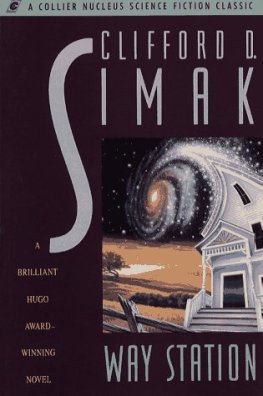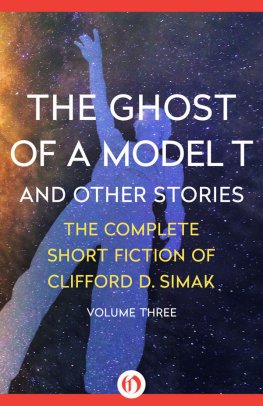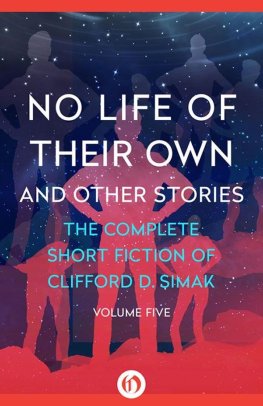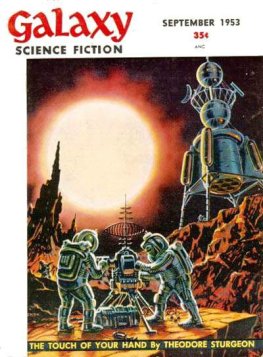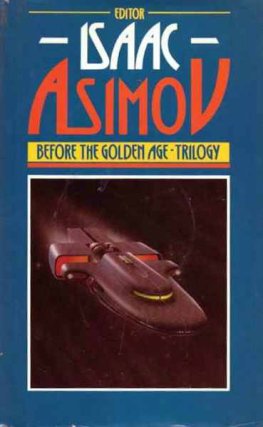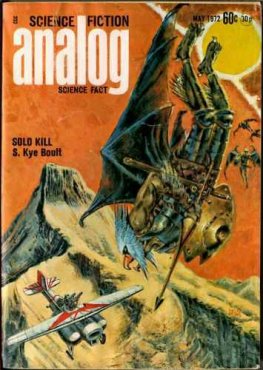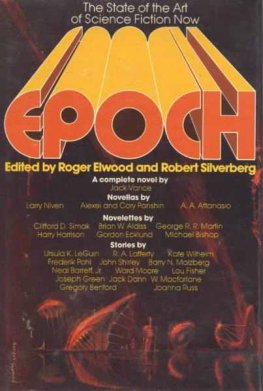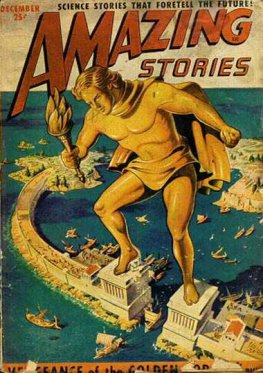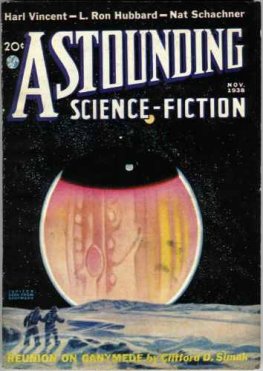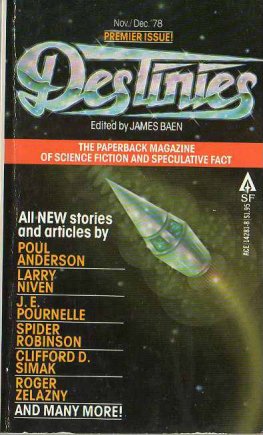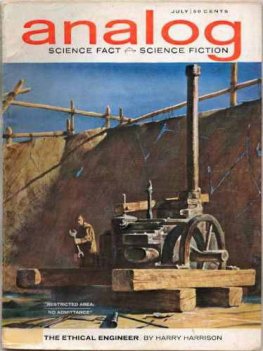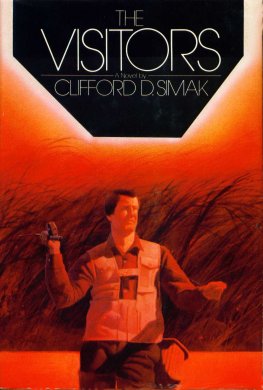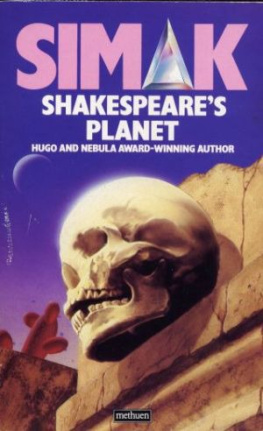Clifford Simak - Way Station
Here you can read online Clifford Simak - Way Station full text of the book (entire story) in english for free. Download pdf and epub, get meaning, cover and reviews about this ebook. genre: Science fiction. Description of the work, (preface) as well as reviews are available. Best literature library LitArk.com created for fans of good reading and offers a wide selection of genres:
Romance novel
Science fiction
Adventure
Detective
Science
History
Home and family
Prose
Art
Politics
Computer
Non-fiction
Religion
Business
Children
Humor
Choose a favorite category and find really read worthwhile books. Enjoy immersion in the world of imagination, feel the emotions of the characters or learn something new for yourself, make an fascinating discovery.
- Book:Way Station
- Author:
- Genre:
- Rating:5 / 5
- Favourites:Add to favourites
- Your mark:
- 100
- 1
- 2
- 3
- 4
- 5
Way Station: summary, description and annotation
We offer to read an annotation, description, summary or preface (depends on what the author of the book "Way Station" wrote himself). If you haven't found the necessary information about the book — write in the comments, we will try to find it.
Way Station — read online for free the complete book (whole text) full work
Below is the text of the book, divided by pages. System saving the place of the last page read, allows you to conveniently read the book "Way Station" online for free, without having to search again every time where you left off. Put a bookmark, and you can go to the page where you finished reading at any time.
Font size:
Interval:
Bookmark:
Clifford D. Simak
WAY STATION
1
The noise was ended now. The smoke drifted like thin, gray wisps of fog above the tortured earth and the shattered fences and the peach trees that had been whittled into toothpicks by the cannon fire. For a moment silence, if not peace, fell upon those few square miles of ground where just a while before men had screamed and torn at one another in the frenzy of old hate and had contended in an ancient striving and then had fallen apart, exhausted.
For endless time, it seemed, there had been belching thunder rolling from horizon to horizon and the gouted earth that had spouted in the sky and the screams of horses and the hoarse bellowing of men; the whistling of metal and the thud when the whistle ended; the flash of searing fire and the brightness of the steel; the bravery of the colors snapping in the battle wind.
Then it all had ended and there was a silence.
But silence was an alien note that held no right upon this field or day, and it was broken by the whimper and the pain, the cry for water, and the prayer for death- the crying and the calling and the whimpering that would go on for hours beneath the summer sun. Later the huddled shapes would grow quiet and still and there would be an odor that would sicken all who passed, and the graves would be shallow graves.
There was wheat that never would be harvested, trees that would not bloom when spring came round again, and on the slope of land that ran up to the ridge the words unspoken and the deeds undone and the sodden bundles that cried aloud the emptiness and the waste of death.
There were proud names that were the prouder now, but now no more than names to echo down the ages the Iron Brigade, the 5th New Hampshire, the 1st Minnesota, the 2nd Massachusetts, the 16th Maine.
And there was Enoch Wallace.
He still held the shattered musket and there were blisters on his hands. His face was smudged with powder. His shoes were caked with dust and blood.
He was still alive.
2
Dr. Erwin Hardwicke rolled the pencil back and forth between his palms, an irritating business. He eyed the man across the desk from him with some calculation.
"What I can't figure out," said Hardwicke, "is why you should come to us."
"Well, you're the National Academy and I thought"
"And you're Intelligence."
"Look, Doctor, if it suits you better, let's call this visit unofficial. Pretend I'm a puzzled citizen who dropped in to see if you could help."
"It's not that I wouldn't like to help, but I don't see how I can. The whole thing is so hazy and so hypothetical."
"Damn it, man," Claude Lewis said, "you can't deny the proof-the little that I have."
"All right, then," said Hardwicke, "let's start over once again and take it piece by piece. You say you have this man"
"His name," said Lewis, "is Enoch Wallace. Chronologically, he is one hundred and twenty-four years old. He was born on a farm a few miles from the town of Millville in Wisconsin, April 22, 1840, and he is the only child of Jedediah and Amanda Wallace. He enlisted among the first of them when Abe Lincoln called for volunteers. He was with the Iron Brigade, which was virtually wiped out at Gettysburg in 1863. But Wallace somehow managed to get transferred to another fighting outfit and fought down across Virginia under Grant. He was in on the end of it at Appomattox"
"You've run a check on him."
"I've looked up his records. The record of enlistment at the State Capitol in Madison. The rest of it, including discharge here in Washington."
"You say he looks like thirty."
"Not a day beyond it. Maybe even less than that."
"But you haven't talked with him."
Lewis shook his head.
"He may not be the man. If you had fingerprints
"At the time of the Civil War," said Lewis, "they'd not thought of fingerprints."
"The last of the veterans of the Civil War," said Hardwicke, "died several years ago. A Confederate drummer boy, I think. There must be some mistake."
Lewis shook his head. "I thought so myself, when I was assigned to it."
"How come you were assigned? How does Intelligence get involved in a deal like this?"
"I'll admit," said Lewis, "that it's a bit unusual. But there were so many implications"
"Immortality, you mean."
"It crossed our mind, perhaps. The chance of it. But only incidentally. There were other considerations. It was a strange setup that bore some looking into."
"But Intelligence"
Lewis grinned. "You are thinking, why not a scientific outfit? Logically, I suppose it should have been. But one of our men ran afoul of it. He was on vacation. Had relatives back in Wisconsin. Not in that particular area, but some thirty miles away. He heard a rumor-just the vaguest rumor, almost a casual mention. So he nosed around a bit. He didn't find out too much but enough to make him think there might be something to it."
"That's the thing that puzzles me," said Hardwicke. "How could a man live for one hundred and twenty-four years in one locality without becoming a celebrity that the world would hear about? Can you imagine what the newspapers could do with a thing like this?"
"I shudder," Lewis said, "when I think about it."
"You haven't told me how."
"This," said Lewis, "is a bit hard to explain. You'd have to know the country and the people in it. The southwestern corner of Wisconsin is bounded by two rivers, the Mississippi on the west, the Wisconsin on the north. Away from the rivers there is flat, broad prairie land, rich land, with prosperous farms and towns. But the land that runs down to the river is rough and rugged; high hills and bluffs and deep ravines and cliffs, and there are certain areas forming bays or pockets that are isolated. They are served by inadequate roads and the small, rough farms are inhabited by a people who are closer, perhaps, to the pioneer days of a hundred years ago than they are to the twentieth century. They have cars, of course, and radios, and someday soon, perhaps, even television. But in spirit they are conservative and clannish-not all the people, of course, not even many of them, but these little isolated neighborhoods.
"At one time there were a lot of farms in these isolated pockets, but today a man can hardly make a living on a farm of that sort. Slowly the people are being squeezed out of the areas by economic circumstances. They sell their farms for whatever they can get for them and move somewhere else, to the cities mostly, where they can make a living."
Hardwicke nodded. "And the ones that are left, of course, are the most conservative and clannish."
"Right. Most of the land now is held by absentee owners who make no pretense of farming it. They may run a few head of cattle on it, but that is all. It's not too bad as a tax write-off for someone who needs that sort of thing. And in the land-bank days a lot of the land was put into the bank."
"You're trying to tell me these backwoods people-is that what you'd call them? engaged in a conspiracy of silence."
"Perhaps not anything," said Lewis, "as formal or elaborate as that. It is just their way of doing things, a holdover from the old, stout pioneer philosophy. They minded their own business. They didn't want folks interfering with them and they interfered with no one else. If a man wanted to live to be a thousand, it might be a thing of wonder, but it was his own damned business. And if he wanted to live alone and be let alone while he was doing it, that was his business, too. They might talk about it among themselves, but to no one else. They'd resent it if some outsider tried to talk about it.
"After a time, I suppose, they came to accept the fact that Wallace kept on being young while they were growing old. The wonder wore off it and they probably didn't talk about it a great deal, even among themselves. New generations accepted it because their elders saw in it nothing too unusual-and anyhow no one saw much of Wallace because he kept strictly to himself.
Font size:
Interval:
Bookmark:
Similar books «Way Station»
Look at similar books to Way Station. We have selected literature similar in name and meaning in the hope of providing readers with more options to find new, interesting, not yet read works.
Discussion, reviews of the book Way Station and just readers' own opinions. Leave your comments, write what you think about the work, its meaning or the main characters. Specify what exactly you liked and what you didn't like, and why you think so.

